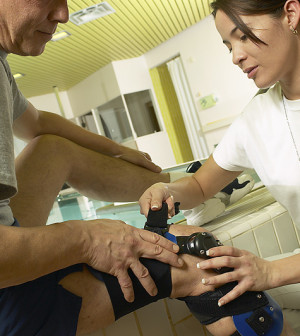- Could Your Grocery Store Meat Be Causing Recurring UTIs?
- Are You Making This Expensive Thermostat Error This Winter?
- Recognizing the Signs of Hypothyroidism
- 10 Strategies to Overcome Insomnia
- Could Artificial Sweeteners Be Aging the Brain Faster?
- Techniques for Soothing Your Nervous System
- Does the Water in Your House Smell Funny? Here’s Why
- Can a Daily Dose of Apple Cider Vinegar Actually Aid Weight Loss?
- 6 Health Beverages That Can Actually Spike Your Blood Sugar
- Treatment Options for Social Anxiety Disorder
Short Stretches of Exercise May Have Anti-Inflammatory Effect

Just 20 minutes of moderate exercise may dampen inflammation in the body, researchers say.
The study findings suggest that “exercise doesn’t have to be tremendously hard for you to see health benefits from it,” said study author Suzi Hong. She is an associate professor at the University of California, San Diego.
The researchers focused on inflammation — swelling — in the body.
The immune system produces swelling by rushing to protect the body from injuries and invaders, such as germs. But inflammation can become permanent, poisoning tissues in the body and contributing to diseases, including diabetes, Hong explained.
Obesity, for example, is thought to produce higher levels of inflammation. That inflammation can contribute to heart disease by affecting the arteries, Hong said.
Studies have suggested that exercise lowers inflammation, especially when you’re active on a regular basis. However, “what is less known is how that is happening,” Hong added.
For the new study, Hong and her colleagues recruited 47 volunteers — a mostly white group of 26 males and 21 females — with an average age of 41. The researchers gave them blood tests before and after the study participants walked at a moderate speed on a treadmill for 20 minutes.
The investigators found a 5 percent decline in immune cells linked to inflammation. Hong called this a “tangible” and “significant” improvement. But it’s not clear what it means for a person’s health, and the study did not prove cause and effect.
Still, she said, it could be helpful for people, regardless of whether they have a disease linked to inflammation.
It’s also unclear whether more exercise means a greater benefit. However, “if you’re seeing this benefit every time you exercise, it’ll have a cumulative effect,” Hong suggested.
David Nieman, director of the Appalachian State University Human Performance Lab, said the new research did not represent a breakthrough — it just reinforced existing knowledge.
“It’s definitely not a high-level study, just confirming things we already know,” he said. “But it’s fine, another bit of information that confirms what we all know in the world of lifestyle and inflammation.”
Nieman said it’s important to fight off inflammation because “it’s a serious issue that undergirds just about every major chronic disease that modern-day men and women experience. It really needs to be managed and reduced.”
The most powerful way to do that, he said, is by controlling weight.
As for future research, Hong said it would be helpful to better understand exactly how exercise affects the body.
“We want to break it down into bite-size pieces for the public and say there are specific immune-based, cell-based changes you’re making when you exercise,” she said.
The study was published online recently in the journal Brain, Behavior, and Immunity.
More information
For more about exercise guidelines, visit the U.S. National Heart, Lung, and Blood Institute.
Source: HealthDay
Copyright © 2026 HealthDay. All rights reserved.










